1
What is love? There is nothing in the world, neither man nor Devil nor any thing, that I hold as suspect as love, for it penetrates the soul more than any other thing. Nothing exists that so fills and binds the heart as love does. Therefore, unless you have those weapons that subdue it, the soul plunges through love into an immense abyss.Umberto Eco
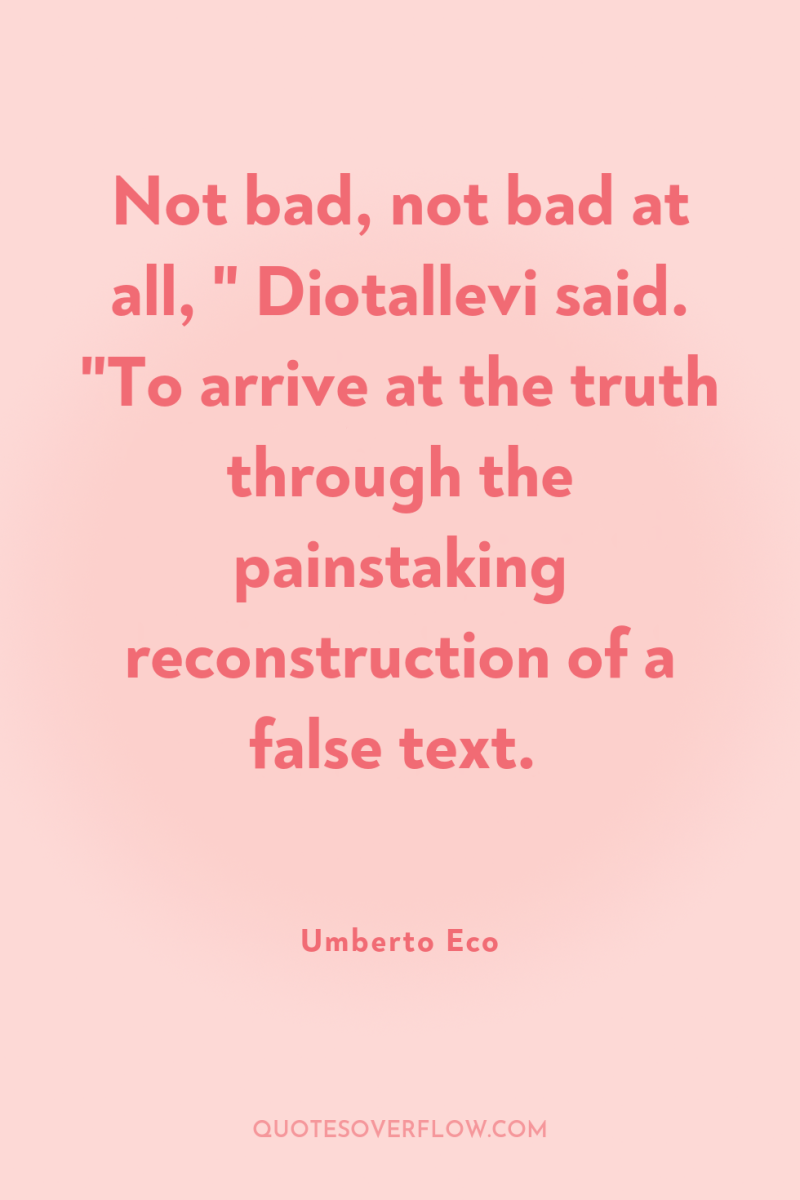
2
Not bad, not bad at all, " Diotallevi said. "To arrive at the truth through the painstaking reconstruction of a false text.Umberto Eco
3
Under torture you are as if under the dominion of those grasses that produce visions. Everything you have heard told, everything you have read returns to your mind, as if you were being transported, not toward heaven, but toward hell. Under torture you say not only what the inquisitor wants, but also what you imagine might please him, because a bond (this, truly, diabolical) is established between you and him .. These things I know, Ubertino; I also have belonged to those groups of men who believe they can produce the truth with white-hot iron. Well, let me tell you, the white heat of truth comes from another flame.Umberto Eco
4
Thus we have on stage two men, each of whom knows nothing of what he believes the other knows, and to deceive each other reciprocally both speak in allusions, each of the two hoping (in vain) that the other holds the key to his puzzle.Umberto Eco
5
After so many years even the fire of passion dies, and with it what was believed the light of the truth. Who of us is able to say now whether Hector or Achilles was right, Agamemnon or Priam, when they fought over the beauty of a woman who is now dust and ashes?Umberto Eco
6
Semiotics is in principle the discipline studying everything which can be used in order to lie. If something cannot be used to tell a lie, conversely it cannot be used to tell the truth: it cannot in fact be used "to tell" at all.Umberto Eco
7
I did not know then what Brother William was seeking, and to tell the truth, I still do not know today, and I presume he himself did not know, moved as he was solely by the desire for truth, and by the suspicion - which I could see he always harbored - that the truth was not what was appearing to him at any given moment.Umberto Eco
8
Atât de mare e puterea adevărului care, precum binele, se răspândeÈâ„¢te de la sine.Umberto Eco
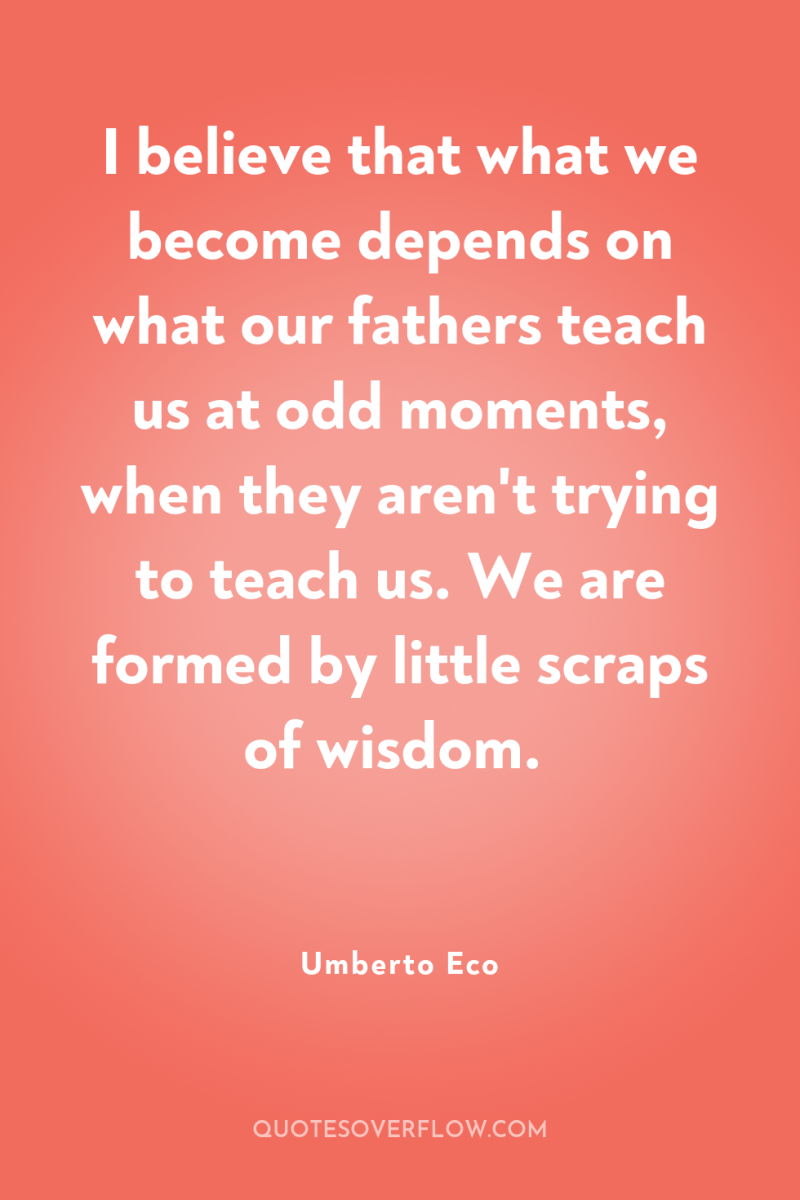
9
I believe that what we become depends on what our fathers teach us at odd moments, when they aren't trying to teach us. We are formed by little scraps of wisdom.Umberto Eco
10
The first quality of an honest man is contempt for religion, which would have us afraid of the most natural thing in the world, which is death; and would have us hate the one beautiful thing destiny has given us, which is life.Umberto Eco
11
Rem tene, verba sequentur: grasp the subject, and the words will follow. This, I believe, is the opposite of what happens with poetry, which is more a case of verba tene, res sequenter: grasp the words, and the subject will follow.Umberto Eco
12
I think that at a certain age, say fifteen or sixteen, poetry is like masturbation. But later in life good poets burn their early poetry, and bad poets publish it. Thankfully I gave up rather quickly.Umberto Eco
13
The older I grow and the more I abandon myself to God's will, the less I value intelligence that wants to know and will that wants to do; andas the only element of salvation I recognize faith, which can wait patiently, without asking too many questions.Umberto Eco
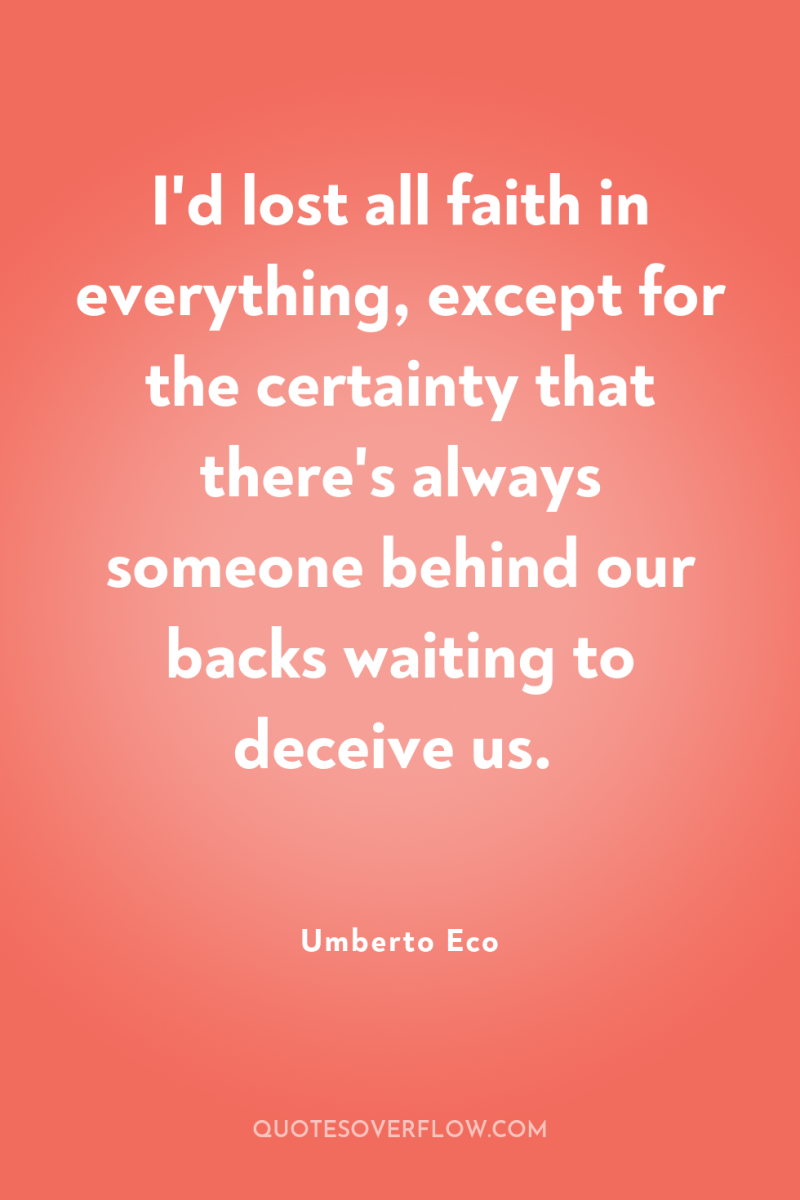
14
I'd lost all faith in everything, except for the certainty that there's always someone behind our backs waiting to deceive us.Umberto Eco
15
All the stories I would like to write persecute me. When I am in my chamber, it seems as if they are all around me, like little devils, and while one tugs at my ear, another tweaks my nose, and each says to me, 'Sir, write me, I am beautiful.Umberto Eco
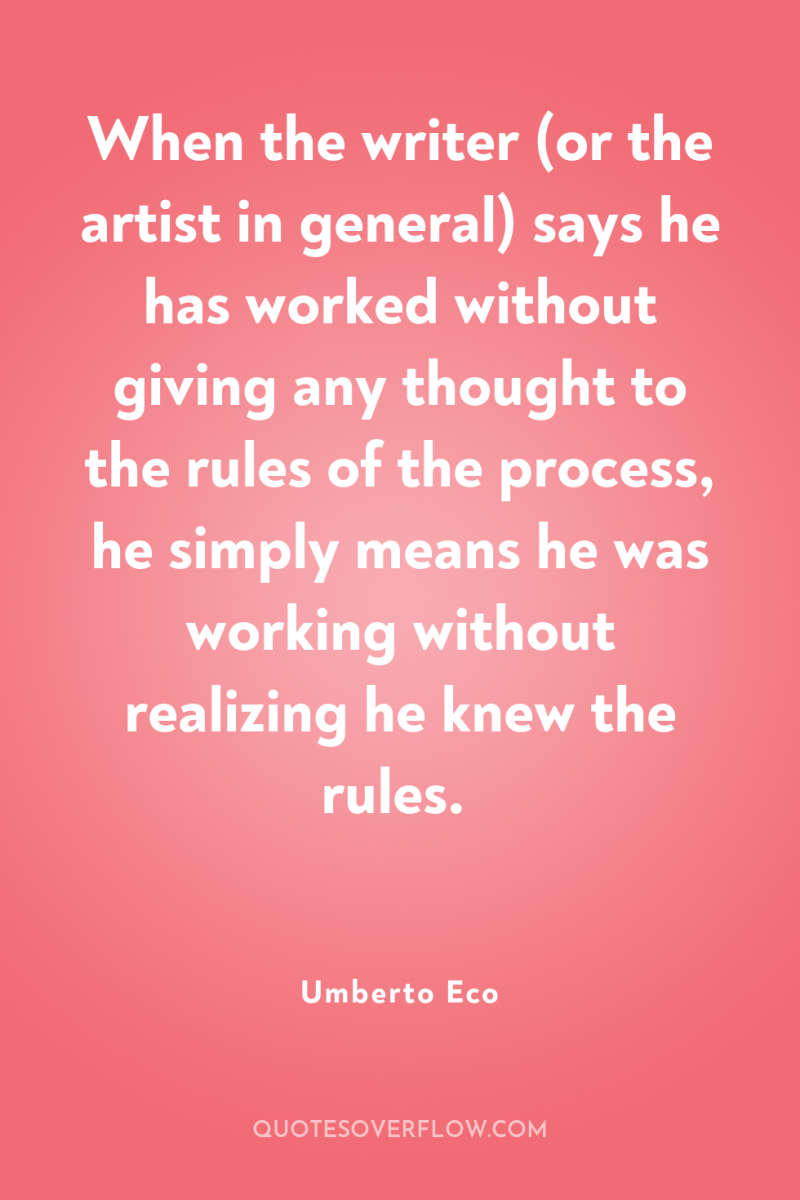
16
When the writer (or the artist in general) says he has worked without giving any thought to the rules of the process, he simply means he was working without realizing he knew the rules.Umberto Eco
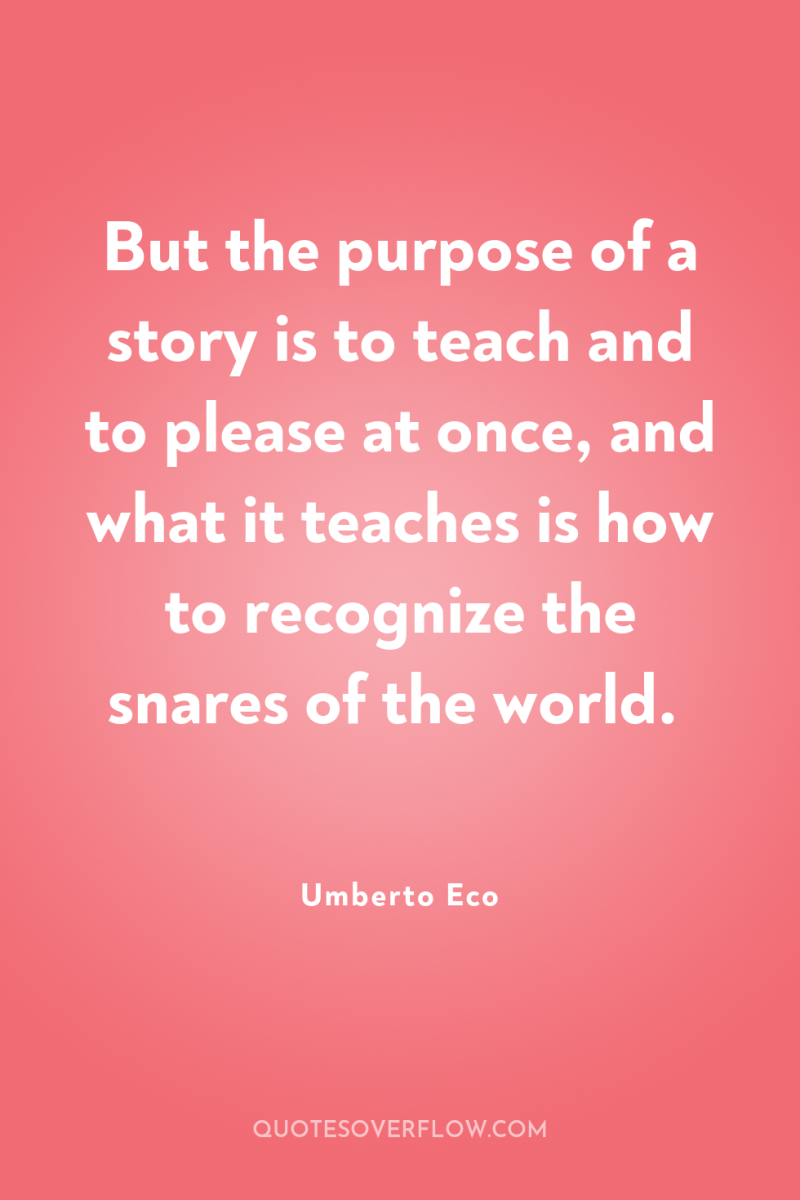
17
But the purpose of a story is to teach and to please at once, and what it teaches is how to recognize the snares of the world.Umberto Eco
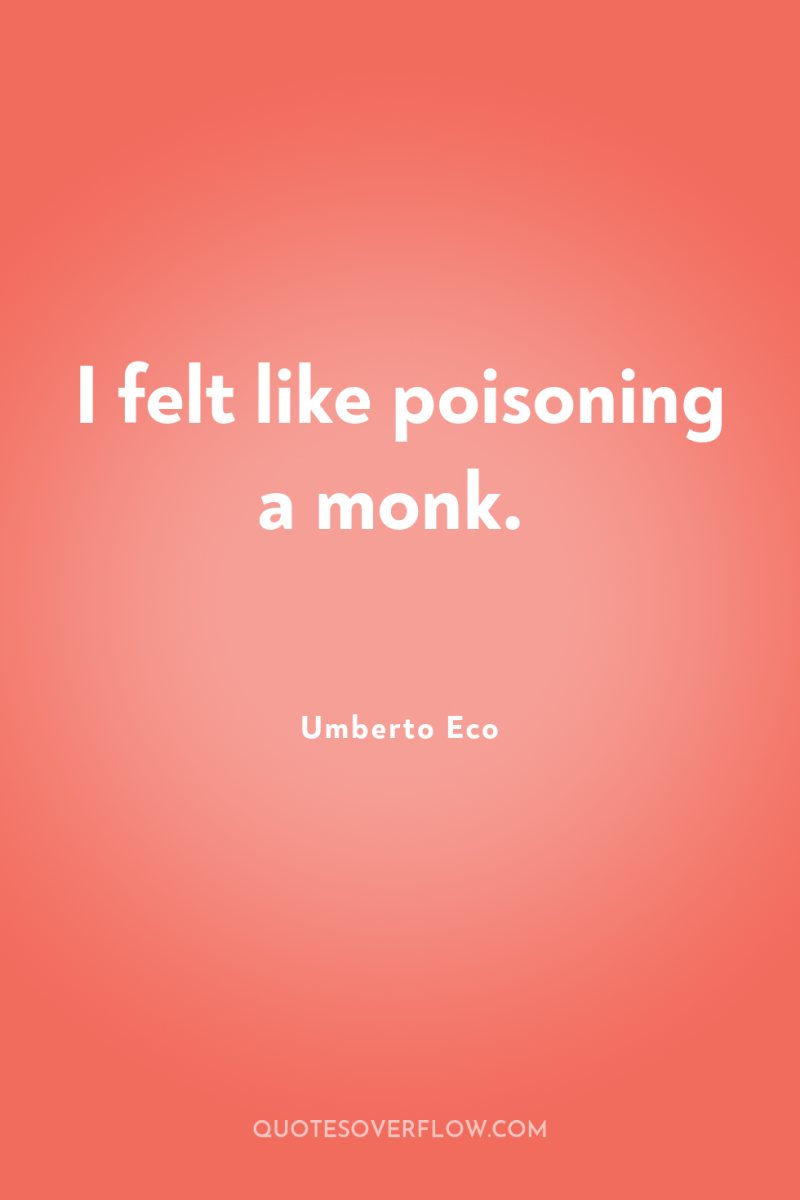
18
I felt like poisoning a monk.Umberto Eco
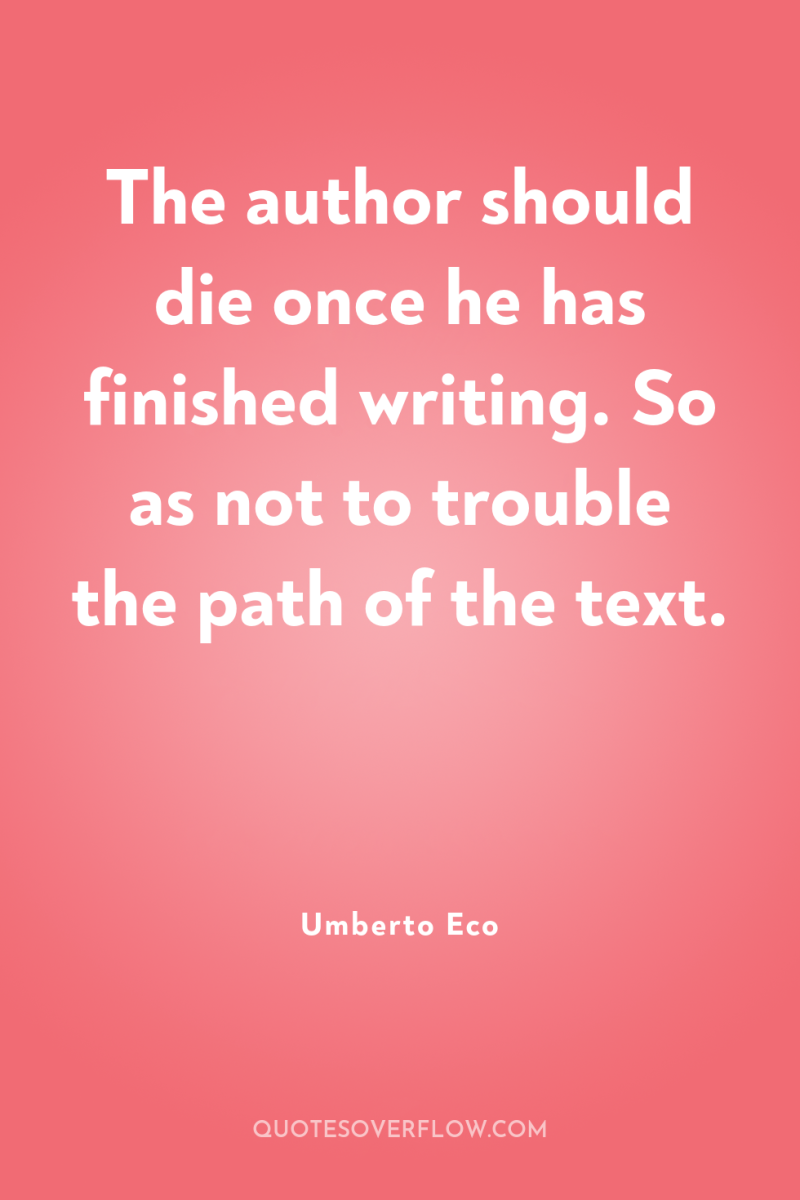
19
The author should die once he has finished writing. So as not to trouble the path of the text.Umberto Eco
20
In the Middle Ages, cathedrals and convents burned like tinder; imagining a medieval story without a fire is like imagining a World War II movie in the Pacific without a fighter plane shot down in flames.Umberto Eco
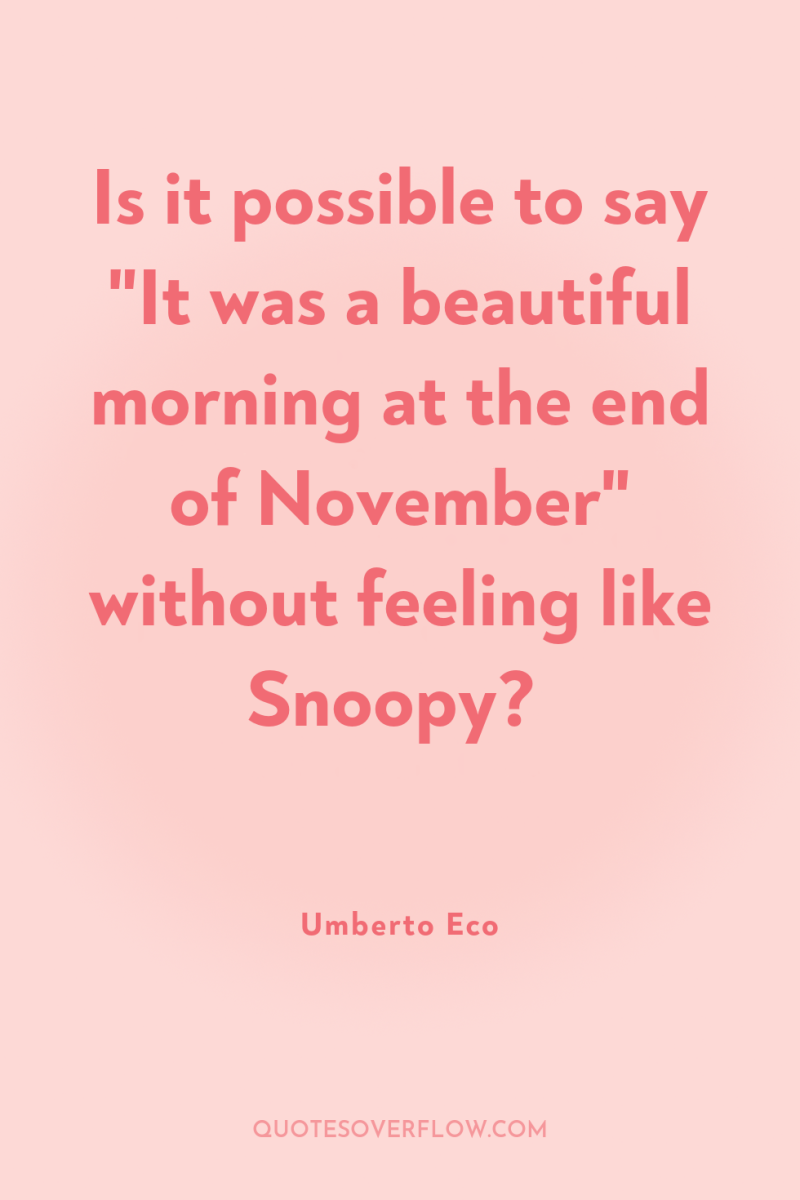
21
Is it possible to say "It was a beautiful morning at the end of November" without feeling like Snoopy?Umberto Eco

22
From shit, thus, I extract pure ShinolaUmberto Eco
23
Since I became a novelist I have discovered that I am biased. Either I think a new novel is worse than mine and I don’t like it, or I suspect it is better than my novels and I don’t like it.Umberto Eco
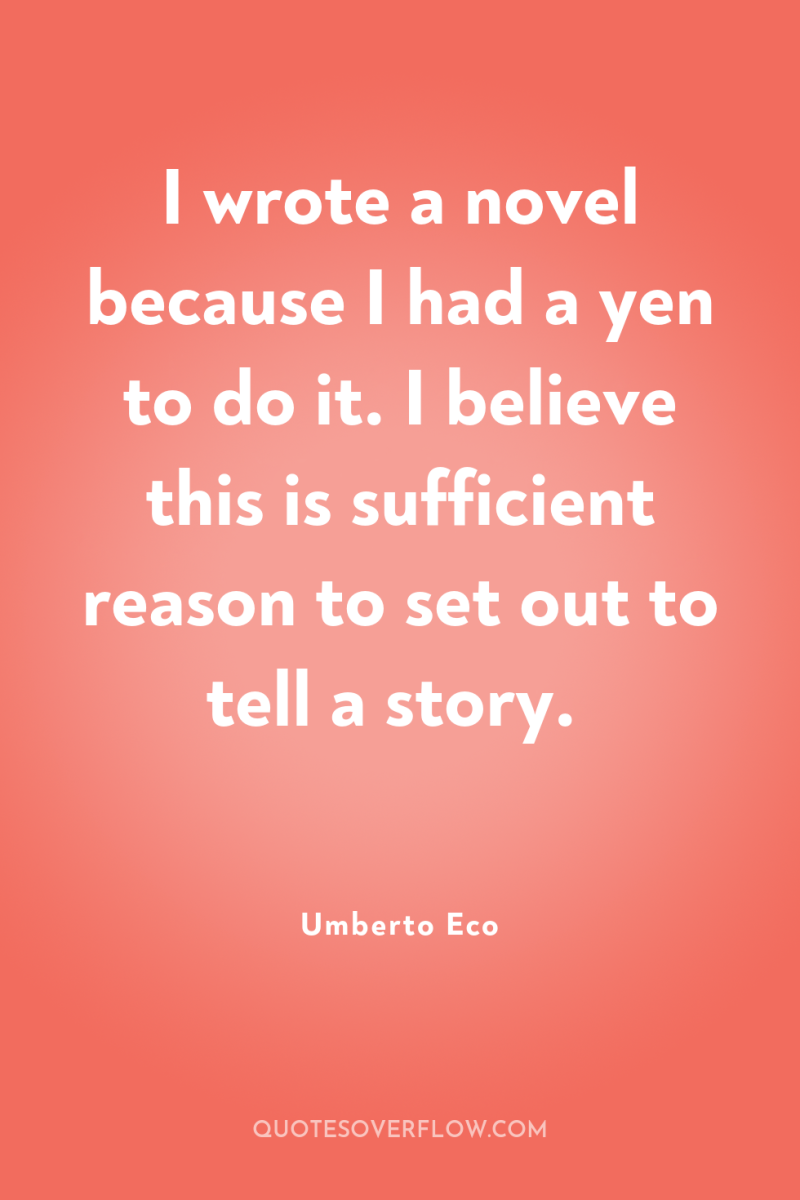
24
I wrote a novel because I had a yen to do it. I believe this is sufficient reason to set out to tell a story.Umberto Eco
25
It seems that the Parisian Oulipo group has recently constructed a matrix of all possible murder-story situations and has found that there is still to be written a book in which the murderer is the reader. Moral: there exist obsessive ideas, they are never personal; books talk among themselves, and any true detection should prove that we are the guilty party.Umberto Eco
26
[W]hen I put Jorge in the library I did not yet know he was the murderer. He acted on his own, so to speak. And it must not be thought that this is an 'idealistic' position, as if I were saying that the characters have an autonomous life and the author, in a kind of trance, makes them behave as they themselves direct him. That kind of nonsense belongs in term papers. The fact is that the characters are obliged to act according to the laws of the world in which they live. In other words, the narrator is the prisoner of his own premises.Umberto Eco
27
There are magic moments, involving great physical fatigue and intense motor excitement, that produce visions of people known in the past ("en me retraçant ces détails, j'en suis à me demander s'ils sont réels, ou bien si je les ai rêvés"). As I learned later from the delightful little book of the Abbé de Bucquoy, there are also visions of books as yet unwritten.Umberto Eco
28
I discovered ... that a novel has nothing to do with words in the first instance. Writing a novel is a cosmological matter, like the story told by Genesis (we all have to choose our role models, as Woody Allen puts it).Umberto Eco
29
In the years when I discoverd the Abbé Vallet volume, there was a widespread conviction that one should write only out of a commitment to the present, in order to change the world. Now, after ten years or more, the man of letters (restored to his loftiest dignity) can happily write out of pure love of writing.Umberto Eco

30
People are never so completely and enthusiastically evil as when they act out of religious conviction.Umberto Eco
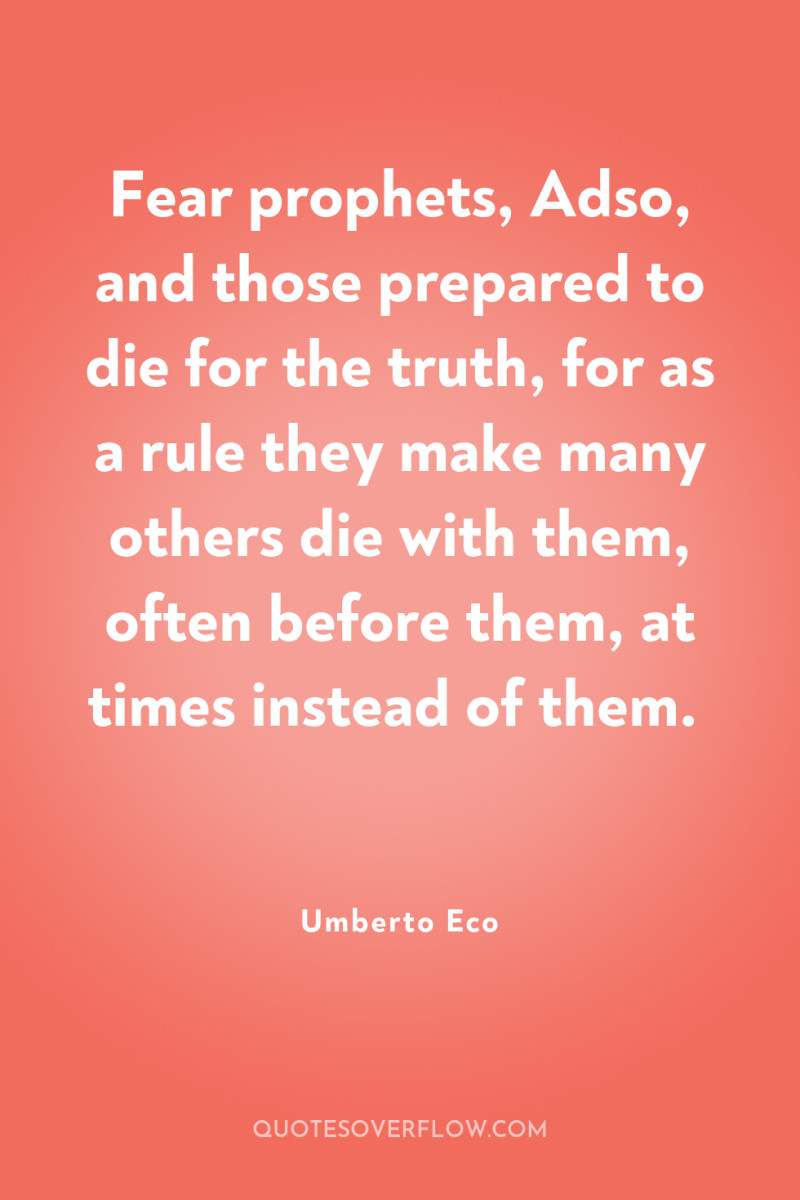
31
Fear prophets, Adso, and those prepared to die for the truth, for as a rule they make many others die with them, often before them, at times instead of them.Umberto Eco
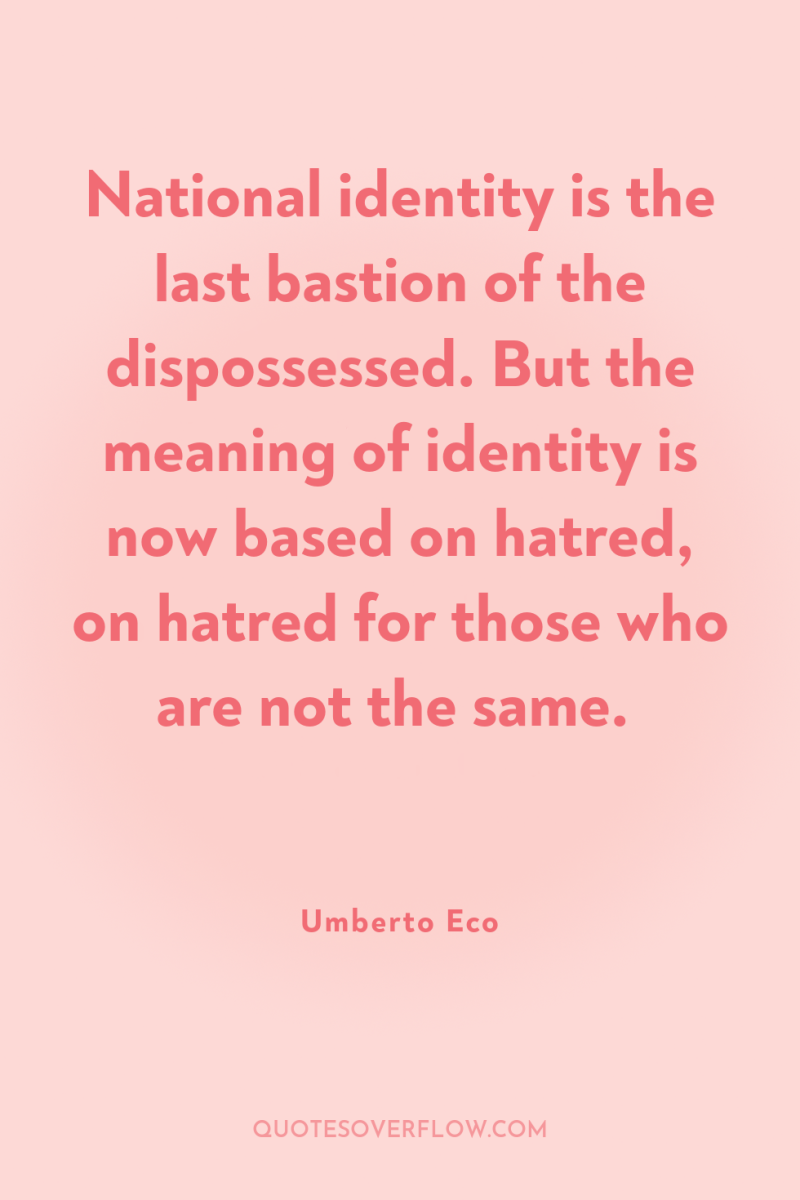
32
National identity is the last bastion of the dispossessed. But the meaning of identity is now based on hatred, on hatred for those who are not the same.Umberto Eco
33
In that face, deformed by hatred of philosophy, I saw for the first time the portrait of the Antichrist, who does not come from the tribe of Judas, as his heralds have it, or from a far country. The Antichrist can be born from piety itself, from excessive love of God or of the truth, as the heretic is born from the saint and the possessed from the seer. Fear prophets, Adso, and those prepared to die for the truth, for as a rule they make many others die with them, often before them, at times instead of them. Jorge did a diabolical thing because he loved his truth so lewdly that he dared anything in order to destroy falsehood. .Umberto Eco
34
El diablo no es el prÃncipe de la materia, el diablo es la arrogancia del espÃritu, la fe sin sonrisa, la verdad jamás tocada por la duda.Umberto Eco

35
Die Menschen tun das Böse nie so vollständig und begeistert, wie wenn sie es aus religiöser Überzeugung tun.Umberto Eco
36
But is the unicorn a falsehood? It's the sweetest of animals and a noble symbol. It stands for Christ and for chastity; it can be captured only by setting a virgin in the forest, so that the animal, catching her most chaste odor, will go and lay its head in her lap, offering itself as prey to the hunters' snares."" So it is said, Adso. But many tend to believe that it's a fable, an invention of the pagans."" What a disappointment, " I said. "I would have liked to encounter one, crossing a wood. Otherwise what's the pleasure of crossing a wood? .Umberto Eco
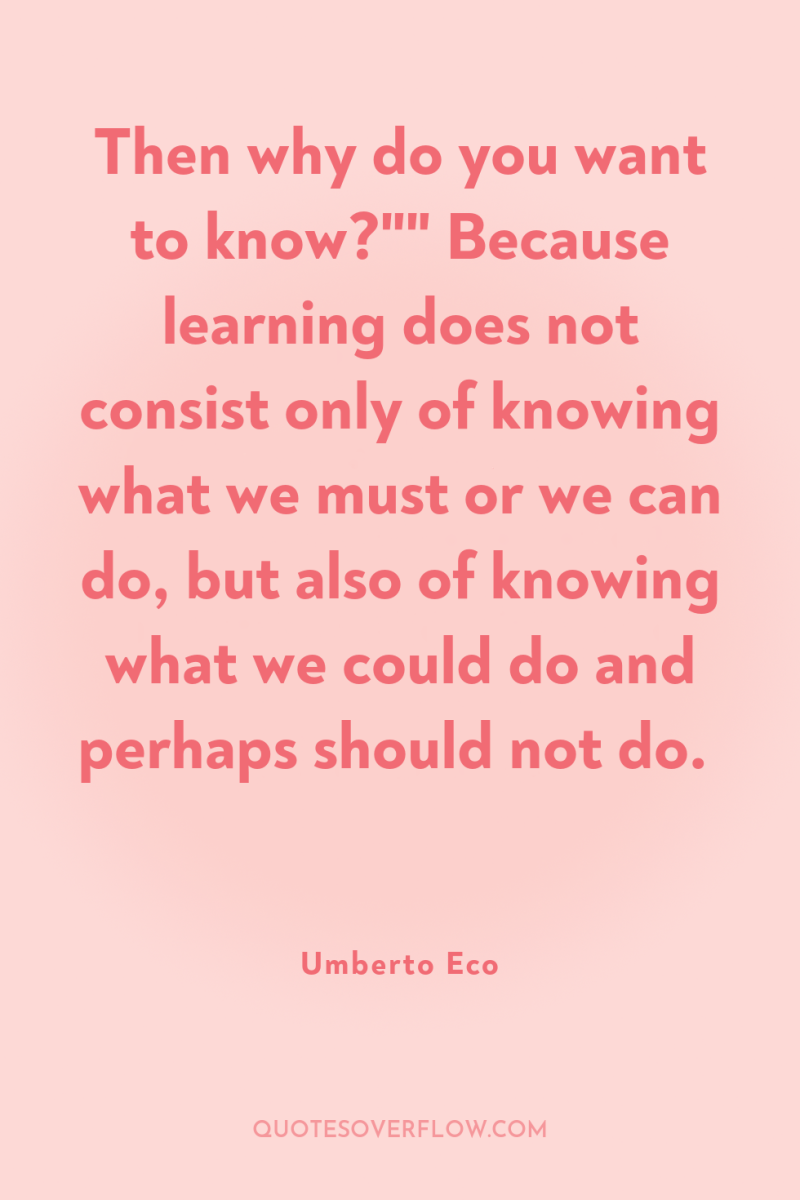
37
Then why do you want to know?"" Because learning does not consist only of knowing what we must or we can do, but also of knowing what we could do and perhaps should not do.Umberto Eco
38
A monk should surely love his books with humility, wishing their good and not the glory of his own curiosity; but what the temptation of adultery is for laymen and the yearning for riches is for secular ecclesiastics, the seduction of knowledge is for monks.Umberto Eco
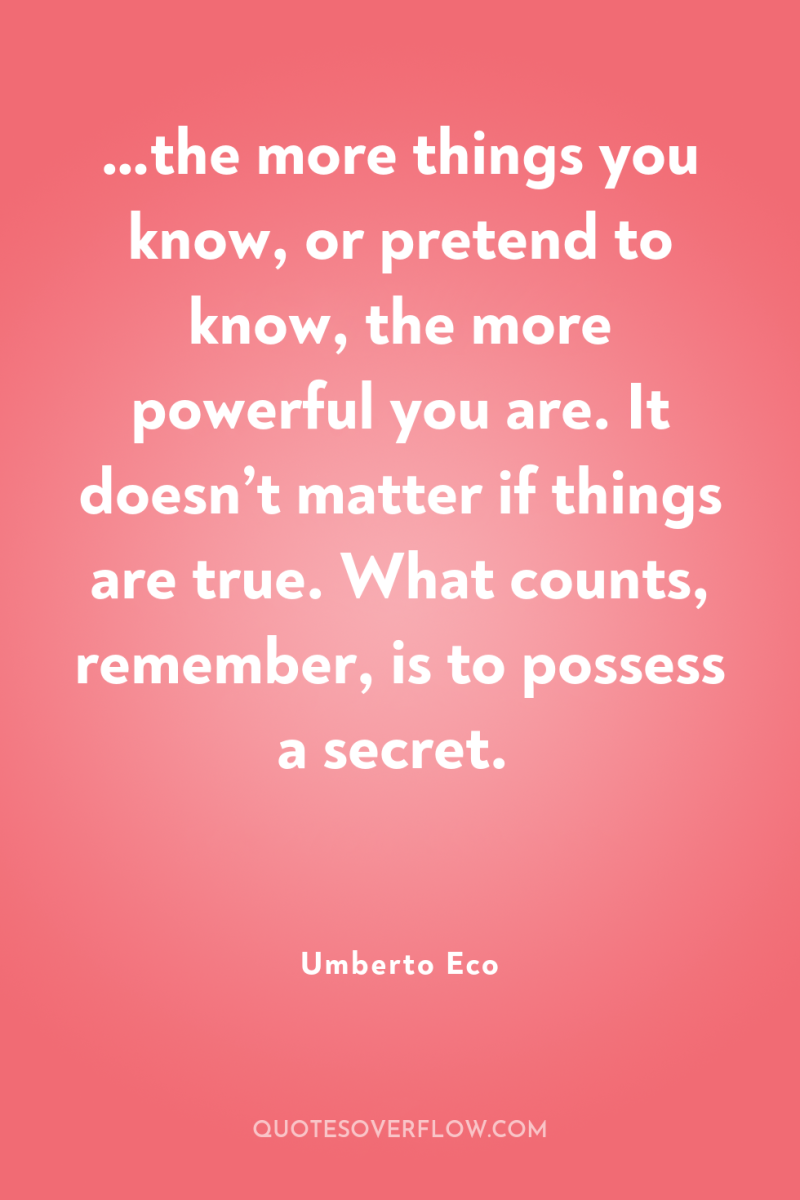
39
…the more things you know, or pretend to know, the more powerful you are. It doesn’t matter if things are true. What counts, remember, is to possess a secret.Umberto Eco
40
I like the notion of stubborn incuriosity. To cultivate a stubborn incuriosity, you have to limit yourself to certain areas of knowledge. You cannot be totally greedy. You have to oblige yourself not to learn everything. Or else you will learn nothing.Umberto Eco
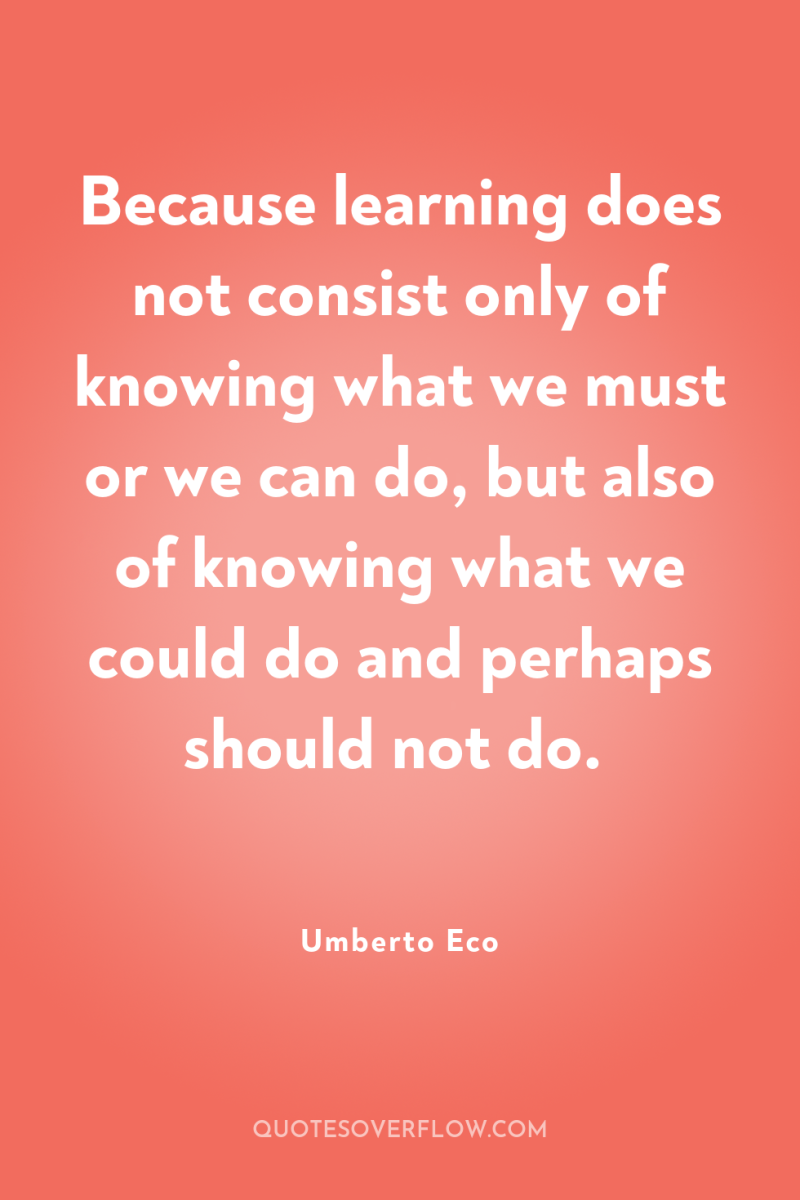
41
Because learning does not consist only of knowing what we must or we can do, but also of knowing what we could do and perhaps should not do.Umberto Eco
42
Well, Diotallevi and I are planning a reform in higher education. A School of Comparative Irrelevance, where useless or impossibe courses are given. The school's aim is to turn out scholars capable of endlessly increasing the number of unnecessary subjects.Umberto Eco

43
If you want to use television to teach somebody, you must first teachthem how to use television.Umberto Eco
44
It’s quite possible that mortality is simply the result of poor education.Umberto Eco
45
The taxi driver is someone who spends all day driving in city traffic (an activity that provokes either heart attack or delirium), in constant conflict with other human drivers. Consequently, he is nervous and hates every anthropomorphic creature.Umberto Eco
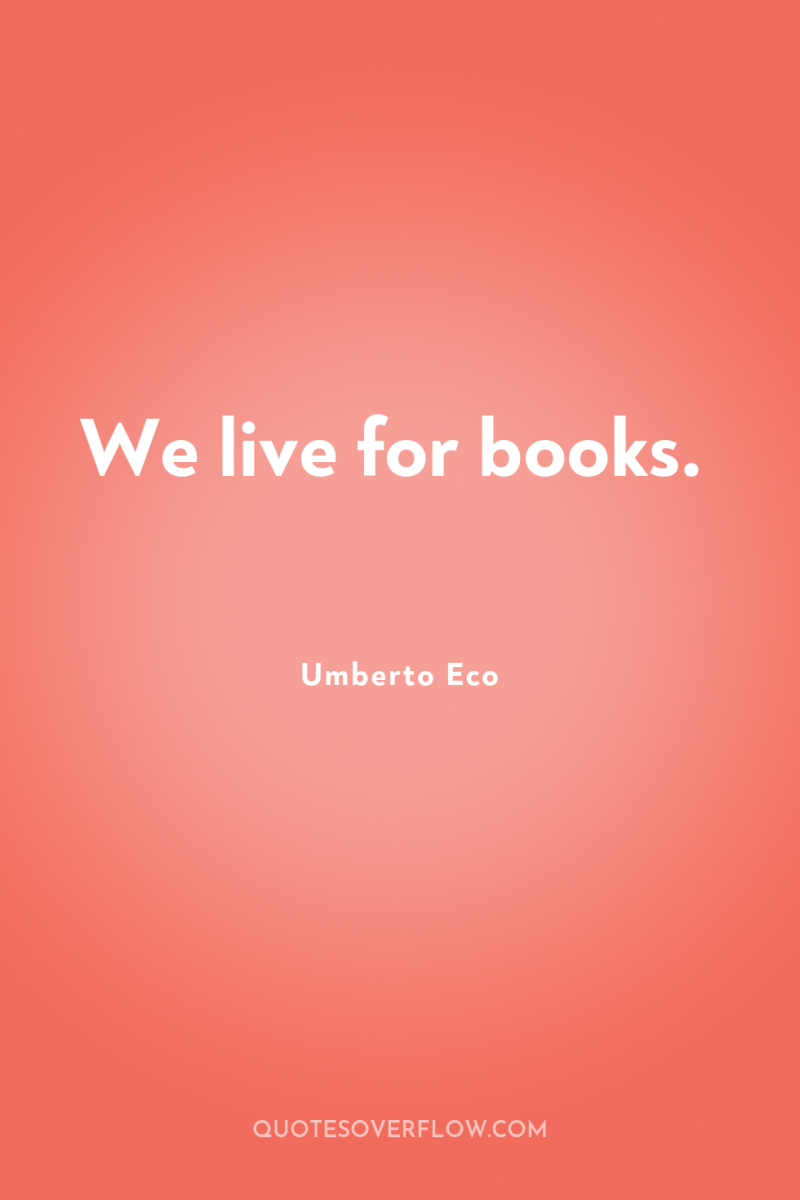
46
We live for books.Umberto Eco
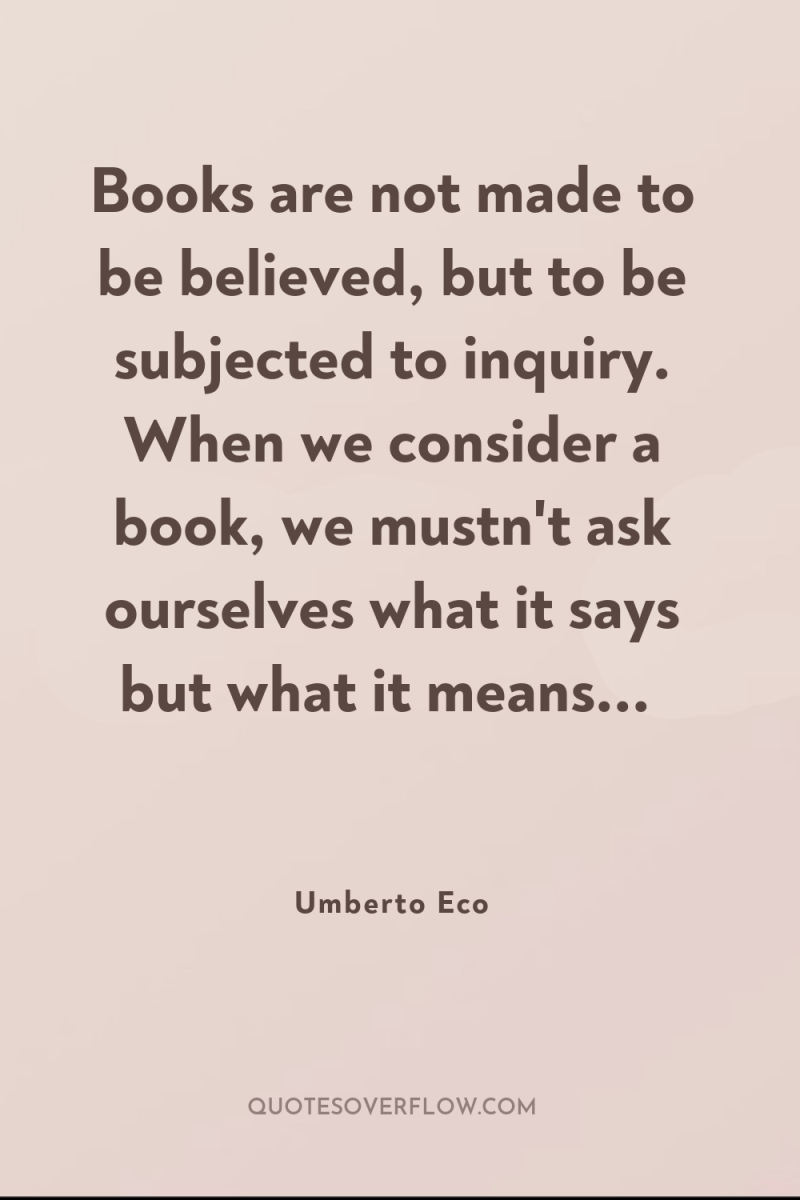
47
Books are not made to be believed, but to be subjected to inquiry. When we consider a book, we mustn't ask ourselves what it says but what it means...Umberto Eco

48
I love the smell of book ink in the morning.Umberto Eco
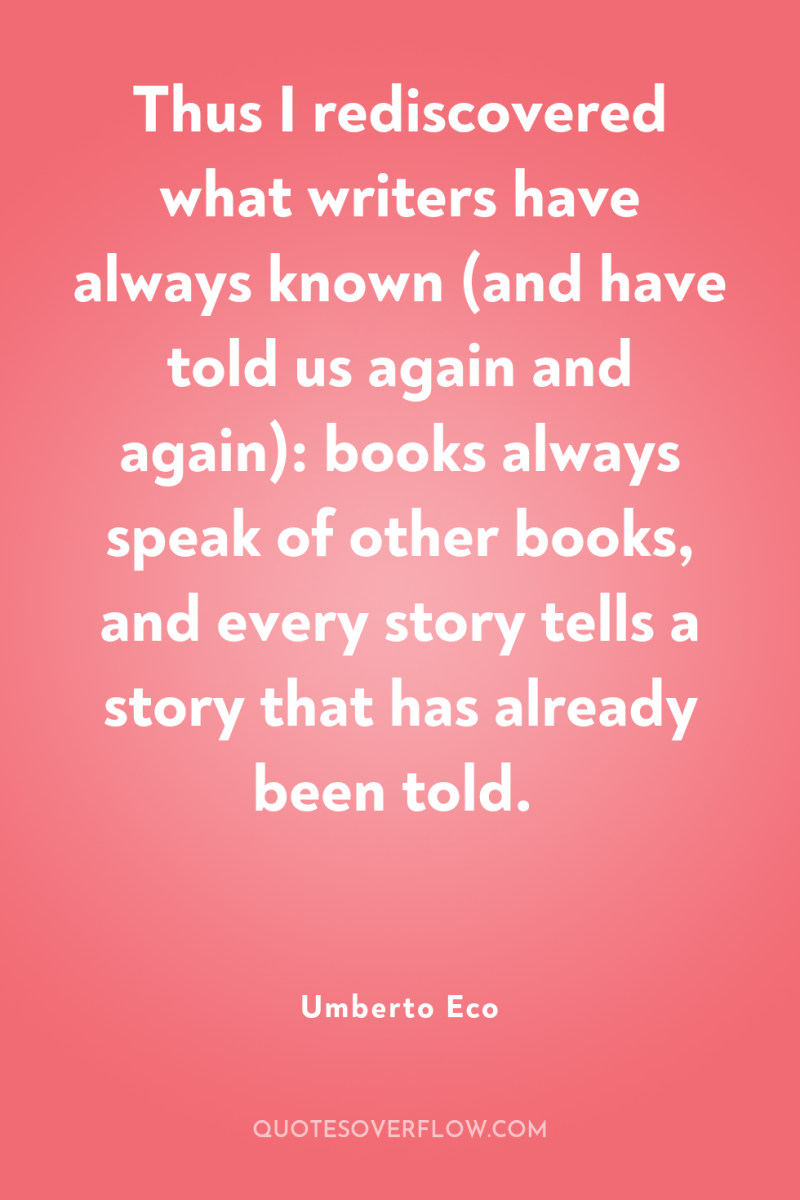
49
Thus I rediscovered what writers have always known (and have told us again and again): books always speak of other books, and every story tells a story that has already been told.Umberto Eco
50
Until then I had thought each book spoke of the things, human or divine, that lie outside books. Now I realized that not infrequently books speak of books: it is as if they spoke among themselves. In the light of this reflection, the library seemed all the more disturbing to me. It was then the place of a long, centuries-old murmuring, an imperceptible dialogue between one parchment and another, a living thing, a receptacle of powers not to be ruled by a human mind, a treasure of secrets emanated by many minds, surviving the death of those who had produced them or had been their conveyors. .Umberto Eco
51
A book is a fragile creature, it suffers the wear of time, it fears rodents, the elements and clumsy hands. so the librarian protects the books not only against mankind but also against nature and devotes his life to this war with the forces of oblivion.Umberto Eco
52
..a book is a fragile creature, it suffers the wear of time, it fears rodents, the elements, clumsy hands. If for a hundred and a hundred years everyone had been able freely to handle our codices, the majority of them would no longer exist. So the librarian protects them not only against mankind but also against nature, and devotes his life to this war with the forces of oblivion, the enemy of truth.Umberto Eco
53
I seem to know all the cliches, but not how to put them together in a believable way. Or else these stories are terrible and grandiose precisely because all the cliches intertwine in an unrealistic way and you can't disentangle them. But when you actually live a cliche, it feels brand new, and you are unashamed.Umberto Eco
54
We stopped to browse in the cases, and now that William - with his new glasses on his nose - could linger and read the books, at every title he discovered he let out exclamations of happiness, either because he knew the work, or because he had been seeking it for a long time, or finally because he had never heard it mentioned and was highly excited and titillated. In short, for him every book was like a fabulous animal that he was meeting in a strange land.Umberto Eco
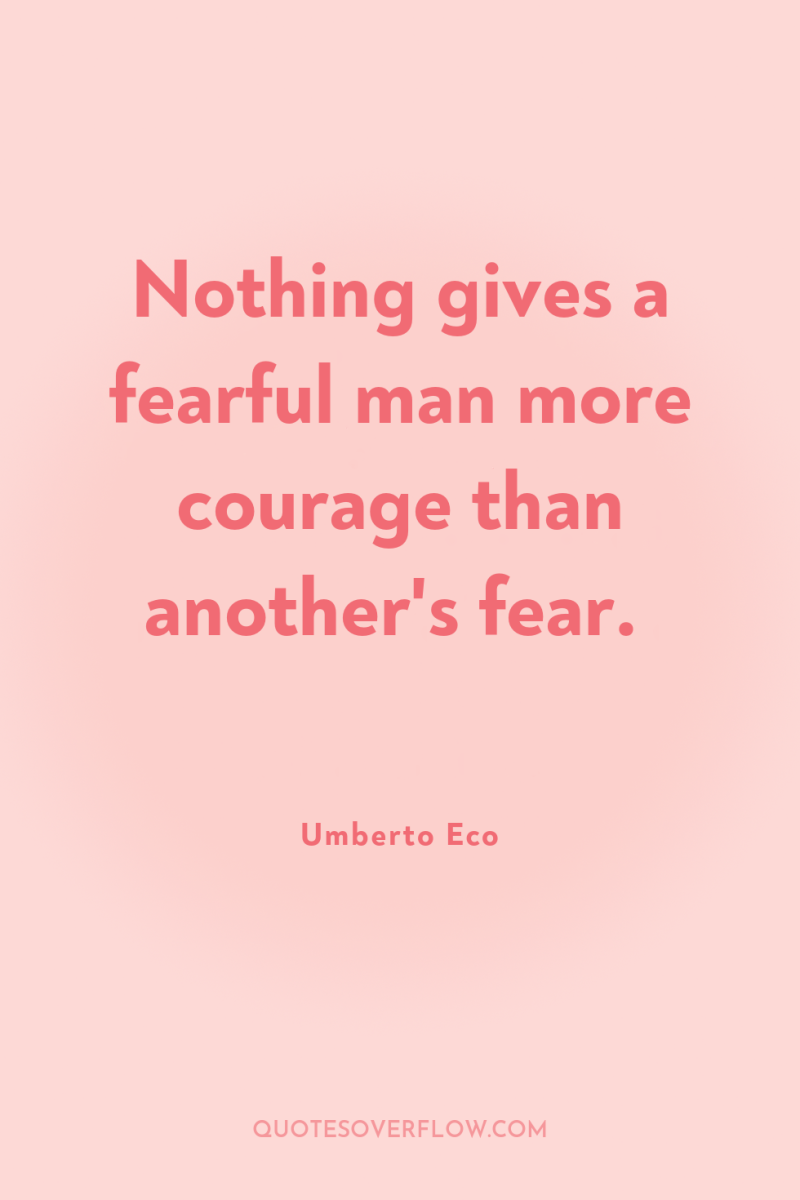
55
Nothing gives a fearful man more courage than another's fear.Umberto Eco
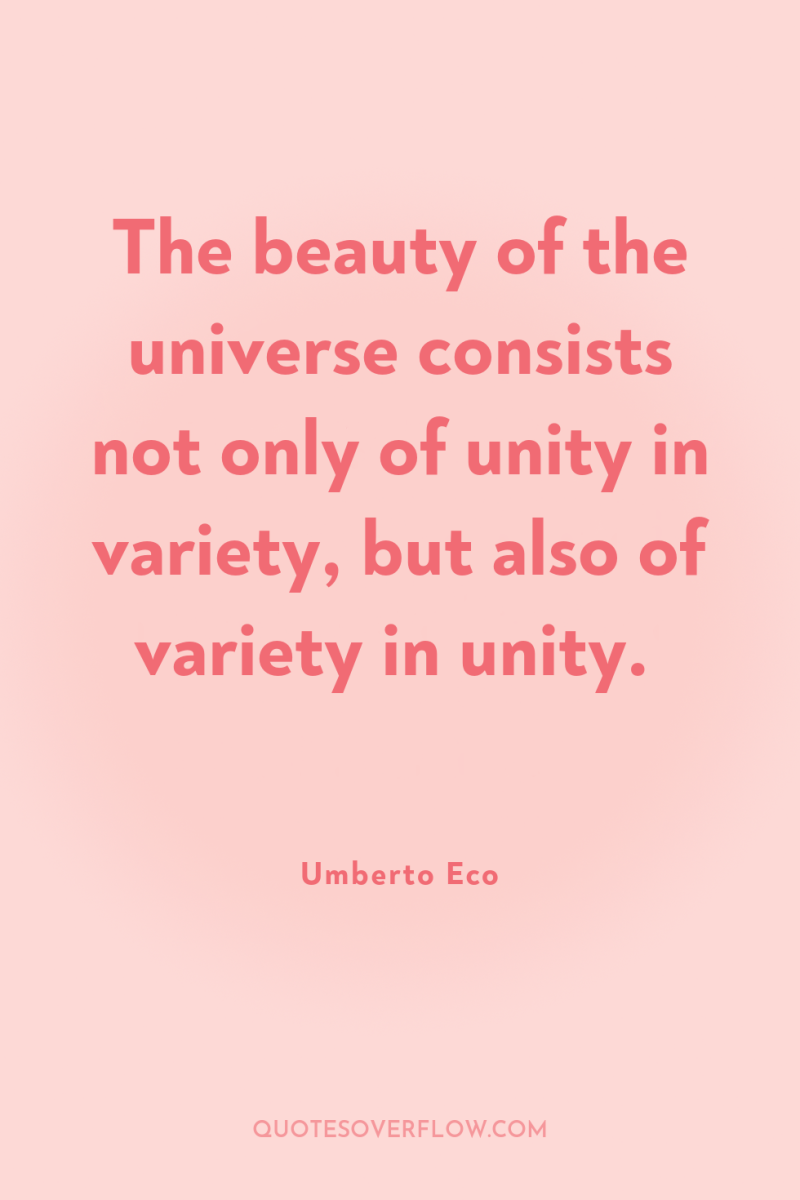
56
The beauty of the universe consists not only of unity in variety, but also of variety in unity.Umberto Eco
57
I say that many of these heresies, independently of the doctrines they assert, encounter success among the simple because they suggest to such people the possibility of a different life. I say that very often the simple do not know much about doctrine. I say that often hordes of simple people have confused Catharist preaching with that of the Patarines, and these together with that of the Spirituals. The life of the simple, Abo, is not illuminated by learning and by the lively sense of distinctions that makes us wise. And it is haunted by illness and poverty, tongue-tied by ignorance. Joining a heretical group, for many of them, is often only another way of shouting their own despair. You may burn a cardinal’s house because you want to perfect the life of the clergy, but also because you believe that the hell he preaches does not exist. .Umberto Eco
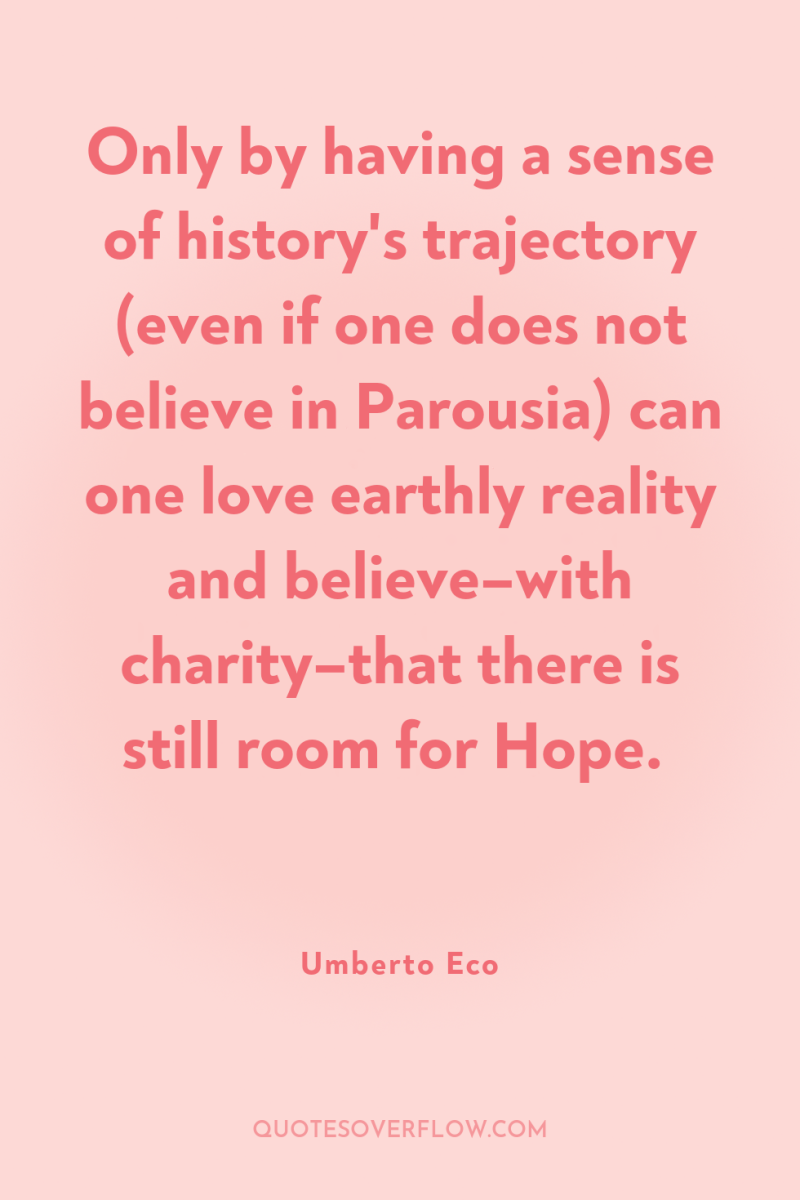
58
Only by having a sense of history's trajectory (even if one does not believe in Parousia) can one love earthly reality and believe–with charity–that there is still room for Hope.Umberto Eco
59
I'd be willing to bet that the notion of the end of time is more common today in the secular world than in the Christian. The Christian world makes it the object of meditation, but acts as if it may be projected into a dimension not measured by calendars. The secular world pretends to ignore the end of time, but is fundamentally obsessed by it. This is not a paradox, but a repetition of what transpired in the first thousand years of history.. I will remind readers that the idea of the end of time comes out of one of the most ambiguous passages of John's text, chapter 20..This approach, which isn't only Augustine's but also the Church Fathers' as a whole, casts History as a journey forward–a notion alien to the pagan world. Even Hegel and Marx are indebted to this fundamental idea, which Pierre Teilhard de Chardin pursued. Christianity invented History, and it is in fact a modern incarnation of the Antichrist that denounces History as a disease. It's possible that secular historicism has understood history as infinitely perfectible–so that tomorrow we improve upon today, always and without reservation.. But the entire secular world is not of the ideological view that through history we understand how to look at the regression and folly of history itself. There is, nonetheless, an originally Christian view of history whenever the signpost of Hope on this road is followed. The simple knowledge of how to judge history and its horrors is fundamentally Christian, whether the speaker is Emmanuel Mounier on tragic optimism or Gramsci on pessimism of reason and optimism of will.Umberto Eco
60
We are a pluralist civilisation because we allow mosques to be built in our countries, and we are not going to stop simply because Christian missionaries are thrown into prison in Kabul. If we did so, we, too, would become Taliban.Umberto Eco
61
Once upon a time there were mass media, and they were wicked, of course, and there was a guilty party. Then there were the virtuous voices that accused the criminals. And Art (ah, what luck! ) offered alternatives, for those who were not prisoners to the mass media. Well, it's all over. We have to start again from the beginning, asking one another what's going on.Umberto Eco
62
Entering a novel is like going on a climb in the mountains: you have to learn the rhythm of respiration, acquire the pace; otherwise you stop right away.Umberto Eco
63
To read fiction means to play a game by which we give sense to the immensity of things that happened, are happening, or will happen in the actual world. By reading narrative, we escape the anxiety that attacks us when we try to say something true about the world. This is the consoling function of narrative – the reason people tell stories, and have told stories from the beginning of time.Umberto Eco
64
Yes, I know, it's not the truth, but in a great history little truths can be altered so that the greater truth emerges.Umberto Eco
65
Is there a notion of hope (and of our responsibility to the future) that could be shared by believers and nonbelievers? What can it be based on now? Does an idea of the end, one that does not imply disinterest in the future but rather a constant examination of the errors of the past, have a critical funUmberto Eco
66
The fact that for tens of thousands of years humanity has used warfare as a solution for states of disequilibrium has no more demonstrable value than the fact that in the same period humanity learned to resolve states of psychological imbalance by using alcohol or other equally devastating substances.Umberto Eco
67
To make them forget how bad human beings are, they were taught too insistently that bears are good. Instead of being told honestly what humans are and what bears are.Umberto Eco
68
But why do some people support [the heretics]?" "Because it serves their purposes, which concern the faith rarely, and more often the conquest of power." "Is that why the church of Rome accuses all its adversaries of heresy?" "That is why, and that is also why it recognizes as orthodoxy any heresy it can bring back under its own control or must accept because the heresy has become too strong.Umberto Eco
69
Scratch the heresy and you will find the leper. Every battle against heresy wants only this: to keep the leper as he is.Umberto Eco
70
I lacked the courage to investigate the weaknesses of the wicked, because I discovered they are the same as the weaknesses of the saintly.Umberto Eco
71
Can you call yourself a coward simply because the courage of others seems to you out of proportion to the triviality of the occasion? Thus wisdom creates cowards. And thus you miss Opportunity while spending your life on the lookout for it.Umberto Eco
72
Any fact becomes important when it's connected to another.Umberto Eco
73
The fine thing about pacts with the devil is that when you sign them you are well aware of their conditions. Otherwise, why would you be recompensed with hell?Umberto Eco
74
But what use is the unicorn to you if your intellect doesn't believe in it?Umberto Eco
75
Translation is the art of failure.Umberto Eco
76
Jacopo, while I could still read, during these past months, I read dictionaries, I studied histories of words, to understand what was happening in my body. I studied like a rabbi. Have you ever reflected that the linguistic term `metathesis' is similar to the oncological term `metastasis'? What is the metathesis? Instead of `clasp' one says `claps.' Instead of `beloved' one says `bevoled.' It's the temurah. The dictionary says that metathesis means the transposition or interchange, while metastasis indicates the change and shifting. How stupid dictionaries are! The root is the same. Either it's the verb metatithemi or the verb methistemi. Metatithemi means I interpose, I shift, I transfer, I substitute, I abrogate a law, I change a meaning. And methistemi? It's the same thing: I move, I transform, I transpose, I switch cliches, I take leave of my senses. And as we sought secret meanings beyond the letter, we all took leave of our senses. And so did my cells, obediently, dutifully. That's why I'm dying, Jacopo, and you know it.Umberto Eco
77
There, Master Niketas, ’ Baudolino said, ‘when I was not prey to the temptations of this world, I devoted my nights to imagining other worlds. A bit with the help of wine, and a bit with that of the green honey. There is nothing better than imagining other worlds, ’ he said, ‘to forget the painful one we live in. At least so I thought then. I hadn’t yet realized that, imagining other worlds, you end up changing this one.Umberto Eco
78
The order that our mind imagines is like a net, or like a ladder, built to attain something. But afterward you must throw the ladder away, because you discover that, even if it was useful, it was meaningless.Umberto Eco
79
Any fact becomes important when it’s connected to another. The connection changes the perspective; it leads you to think that every detail of the world, every voice, every word written or spoken has more than its literal meaning, that it tells us a Secret.Umberto Eco
80
He is always on the brink of suicide... because he seeks salvation through the routine formulas suggested to him by the society in which he lives.Umberto Eco
81
We always have to blame our failures on somebody else, and dictatorships always need an external enemy to bind their followers together. As the man said, for every complex problem there’s a simple solution, and it’s wrong.Umberto Eco
82
The Templars' mental confusion makes them indecipherable. That's why so many people venerate them.Umberto Eco
83
How clear everything becomes when you look from the darkness of a dungeon!Umberto Eco
84
The faith a movement proclaims doesn't count: what counts is the hope it offers. All heresies are the banner of a reality, an exclusion. Scratch the heresy and you will find the leper. Every battle against heresy wants only this: to keep the leper as he is.Umberto Eco
85
For centuries, as pope and emperor tore each other apart in their quarrels over power, the excluded went on living on the fringe, like lepers, of whom true lepers are only the illustration ordained by God to make us understand this wondrous parable, so that in saying 'lepers' we would understand 'outcast, poor, simple, excluded, uprooted from the countryside, humiliated in the cities.' But we did not understand; the mystery of leprosy has continued to haunt us because we have not recognized the nature of the sign.Umberto Eco
86
There is only one thing that you write for yourself, and that is a shopping list.Umberto Eco
87
But why, everybody asks, am I not blessed by fortune (or at least not as blessed as I would like to be)? Why have I not been favored like others who are less deserving? No one believes their misfortunes are attributable to any shortcomings of their own; that is why they must find a culprit.Umberto Eco
88
The devil is not the prince of matter; the devil is the arrogance of spirit, faith without smile, truth that is never seized by doubt. The devil is grim because he knows where he is going, and, in moving, he always returns from whence he came.Umberto Eco
89
What is a saint supposed to do, if not convert wolves?Umberto Eco
90
We need an enemy to give people hope. Someone said that patriotism is the last refuge of cowards: those without moral principles usually wrap a flag around themselves, and the bastards always talk about the purity of the race. National identity is the last bastion of the dispossessed. But the meaning of identity is now based on hatred, on hatred for those who are not the same. Hatred has to be cultivated as a civic passion. The enemy is the friend of the people. You always want someone to hate in order to feel justified in your own misery. Hatred is the primordial passion. It is love that’s abnormal.Umberto Eco
91
He is, or has been, in many ways a great man. But for this very reason he is odd. It is only petty men who seem normal.Umberto Eco
92
I dared, for the first and last time in my life, to express a theological conclusion: "But how can a necessary being exist totally polluted with the possible? What difference is there, then, between God and primogenial chaos? Isn't affirming God's absolute omnipotence and His absolute freedom with regard to His own choices tantamount to demonstrating that God does not exist?Umberto Eco
93
The monkish vows keep us far from that sink of vice that is the female body, but often they bring us close to other errors. Can I finally hide from myself the fact that even today my old age is still stirred by the noonday demon when my eyes, in choir, happen to linger on the beardless face of a novice, pure and fresh as a maiden's?Umberto Eco
94
But it has often happened that I have found the most seductive depictions of sin in the pages of those very men of incorruptible virtue who condemned their spell and their effects.Umberto Eco
95
And what would we be, we sinful creatures, without fear, perhaps the most foresighted, the most loving of the divine gifts?Umberto Eco
96
The book is like the spoon, scissors, the hammer, the wheel. Once invented it cannot be improved. You cannot make a spoonthat is better than a spoonUmberto Eco
97
Until then I had thought each book spoke of the things, human or divine, that lie outside books. Now I realized that not infrequently books speak of books: it is as if they spoke among themselves. In the light of this reflection, the library seemed all the more disturbing to me. It was then the place of a long, centuries -old murmuring, an imperceptible dialogue between one parchment and another, a living thing, a receptacle of powers not to be ruled by a human mind, a treasure of secrets emanated by many minds, surviving the death of those who had produced them or had been their conveyors. .Umberto Eco
98
The book is like the spoon, scissors, the hammer, the wheel. once invented, it cannot be improvedUmberto Eco
99
Throughout our lives, after all, we look for a story of our origins, to tell us why we were born and why we have lived.Umberto Eco
100
The people of God cannot be changed until the outcasts are restored to its body.Umberto Eco